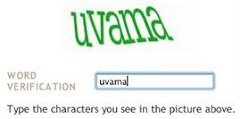Subscribe to:
Post Comments (Atom)
This blog is for the students in English 189, English for Business, at Athabasca University.
Athabasca University

It really does exist!
Our Visitor Globe--click on it!
Followers
Posting to the blog

How to post comments to the course blog There are 5 steps in the process: 1. Click on "comments"--it's a line at the bottom of each posting on the blog. 2. Type your answer in the "Leave Your Comment" box. 3. Complete the word verification process (type the squiggly letters you see in the box). 4. Choose an identity. Generally, unless you already have a Blogger ID, select "Name/URL" and then type your first name (we must be able to identify you to give you credit for your posts) into the box that appears. 5. Click on "publish your comment".
STUDENT AWARDS
Check out the Student Awards web site for all the details.
DEFINITIONS
Clause: A clause is a group of words containing a subject and a verb.
Independent clause: A clause that can be used alone as a sentence and that does not need any other grammatical construction: e.g. He hit the ball over the fence.
Dependent clause: A clause that cannot form a separate sentence; there must be an independent clause for it to modify: e.g. When Peter played baseball, he hit the ball over the fence.
Phrase: A group of words used together to express an idea but without a subject and a verb: e.g. In the game yesterday, he hit the ball over the fence.
Independent clause: A clause that can be used alone as a sentence and that does not need any other grammatical construction: e.g. He hit the ball over the fence.
Dependent clause: A clause that cannot form a separate sentence; there must be an independent clause for it to modify: e.g. When Peter played baseball, he hit the ball over the fence.
Phrase: A group of words used together to express an idea but without a subject and a verb: e.g. In the game yesterday, he hit the ball over the fence.
GRAMMAR GIRL!
For a humourous look at grammar and some of the stickier grammatical situations, check out Grammar Girl. There is a site called Quick and Dirty Tips, and there is also a series of podcasts available. A book on the same topic has just been published. For those of you who are on Facebook, you might like to become a fan of Grammar Girl.
BUSINESS VOCABULARY
Check out this video site that explains a number of business terminologies. There are a number of related sites.
IDIOMS
If English is not your first language, then English idioms are probably difficult for you. The BBC has a site that provides interesting and crazy videos to explain a variety of idioms.
PUNCTUATION BASICS
1. When using an introductory phrase, remember to set it off with a comma.
2. If you have an introductory dependent clause, set it off with a comma.
3. Two independent clauses can be more difficult; use a semicolon to separate them if there is no coordinating conjunction, but use a comma if there is a one.
2. If you have an introductory dependent clause, set it off with a comma.
3. Two independent clauses can be more difficult; use a semicolon to separate them if there is no coordinating conjunction, but use a comma if there is a one.
CONJUNCTIONS
Coordinating Conjunctions (FANBOYS)
For
And
Nor
But
Or
Yet
So
Subordinating Conjunctions (WISH ABOUT)
Who, what, where, when, why, which, whether, while
I
Since, so that
How
As, after, although
Before, because
Once
Unless, until
Than, that, though
For
And
Nor
But
Or
Yet
So
Subordinating Conjunctions (WISH ABOUT)
Who, what, where, when, why, which, whether, while
I
Since, so that
How
As, after, although
Before, because
Once
Unless, until
Than, that, though
SPELLING TEST
Blog Archive
-
▼
2008
(180)
-
▼
November
(15)
- MODULE 1 & ASSIGNMENT 1
- MODULE 2 & ASSIGNMENT 2
- MODULE 3 & ASSIGNMENT 3
- MODULE 4 & ASSIGNMENT 4
- MODULE 5 & ASSIGNMENT 5
- MODULE 6 & ASSIGNMENT 6
- MODULE 7 & ASSIGNMENT 7
- MODULE 8 & ASSIGNMENT 8
- GRAMMAR QUESTION, November 20, 2009
- PUZZLE, Nov. 20th, 2009
- GRAMMAR QUESTION, Nov. 10th, 2009
- PUZZLE, Nov 10th, 2009
- ALL CHANGE! Nov. 10th, 2009
- COMPLETE THE SENTENCE ... Nov. 10th, 2009
- VOCABULARY, Nov. 10th, 2009
-
▼
November
(15)
WHAT’S NEW IN PUNCTUATION?
Have you ever heard of the interrobang? It’s a symbol that is cross between a question mark and an exclamation mark. Check some background information about it, and listen to a CBC podcast that includes a discussion of this interesting punctuation mark. However, there is a word of warning--don’t use it in formal academic writing.
What Did You Say?
On Nytol Sleep Aid -- "Warning: May cause drowsiness."
What was really meant?
4 comments:
Should the Resume be double spaced in Word as well before handing in?
That's a good question. Because a resume uses different formatting, it is all right to use single spacing--or other spacing--if you want.
What exactly is "passive sentence structure" and what habit needs to develop to avoid it. I understand the importance to have clear and direct writing but find it difficult to express charisma or amicable language. This was particularly challenging when writing the cover letter. Please advise.
A passive sentence is one in which the usual word order ( subject + verb + object) is reversed:
e.g. The boy broke the window. (active)
The window was broken by the boy. (passive)
Use it when the person doing the action is not as important as the fact of the action. You can see that it is a more indirect and wordy way of expressing yourself. Particularly in business communication, which needs to be direct and to the point, you should avoid it. You can find more information on pages 80 to 84 on Barron's Business English. There is also more information online--check the Write Site (English Grammar Handbook and Concise ESL Support).
Post a Comment